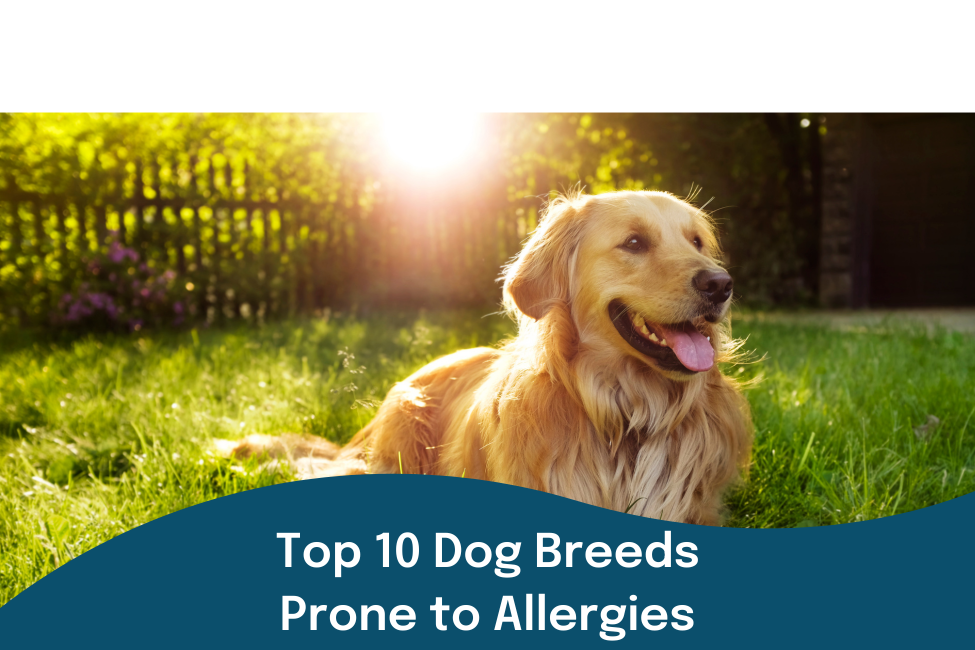
Top 10 Dog Breeds Prone to Allergies
|
|
Time to read 4 min
|
|
Time to read 4 min
Dogs, like humans, can be allergic to all sorts of different things, which can make them uncomfortable and sometimes have health complications. Knowing which breeds are more likely to suffer from allergies means you’ll be able to know what to expect if your dog is one of these breeds. Most importantly though, it will also help you know how you can help your dog and reduce the likelihood of them suffering from an allergy.
In this article, we will take a look at the top 10 dog breeds that are more likely to suffer from allergies, which allergies they are more prone to and what you can do to help. So, let’s take a look at which breeds are on our list.
With their friendly personality and unwavering loyalty, Labradors are one of the most beloved dog breeds. However, they are also prone to allergies, especially ones that affect their skin. These allergies can be caused by various factors, such as certain foods, environmental triggers like pollen or dust, and even flea bites.
Golden Retrievers, like Labradors, are particularly prone to getting irritated skin. Their luscious coats means it’s easier for allergens, such as pollen and dust mites, to get trapped in their fur. This means they’re more likely to itch and get sore skin.
Bulldogs are highly susceptible to various allergies, particularly to food and environmental allergens. These allergies can lead to them suffering from symptoms such as skin irritations, ear infections, and gastrointestinal problems.
Boxers are prone to developing environmental allergies, including reactions to common allergens such as pollen, mould, and dust mites. These allergies typically cause symptoms like itchy skin, ear infections, and respiratory difficulties.
Dalmatians, known for their distinctive coat, are not exempt from allergies. They can be prone to various types of allergies, including food, contact, and even autoimmune disorders. To effectively manage their allergies, it is crucial to carefully monitor their diet and ensure it is free from potential allergens.
Shih Tzus are particularly susceptible to various allergies, with the most prominent food and environmental allergies. These allergies commonly manifest as itching, skin rashes, and respiratory problems.
Cocker Spaniels are known to have a high vulnerability to allergies, particularly those triggered by environmental factors like grass, pollen, and dust mites. These allergies often manifest as uncomfortable symptoms such as itching, recurrent ear infections, and skin problems.
West Highland White Terriers, affectionately known as Westies, are prone to various allergies, including food and atopic dermatitis. Their sensitive skin can become itchy and inflamed, resulting in excessive scratching and the risk of secondary infections.
Lhasa Apsos, with their long, flowing coats, are prone to allergies, particularly those triggered by environmental factors such as dust, pollen, and mould. These allergies often lead to symptoms like sneezing, itching, and eye discharge.
Poodles can be prone to skin and food allergies. This can lead to itching, redness, and skin irritation as well as upset tummies if they eat something they are allergic to such as chicken, beef or grains.
Prevention is better than cure so it’s always good to do as much as possible to help stop your dog suffering from symptoms. There are some simple things you can do to help ease symptoms or even stop them completely:
All in all, there are a lot of things that you can do if your dog's breed is prone to allergies. It's a journey, and you don't have to go through it alone! Your vet is always there to give you advice and reassurance, so if you are concerned about your dog’s symptoms it’s best to get their advice.
Additionally, make sure that you invest in pet-friendly hypoallergenic products, pay close attention to your pup's diet, bathe them regularly with products formulated for sensitive skin types, and keep their environment comfortable. A little patience and effort on your part can really pay off in the long run when it comes to caring for your pup's allergies.









